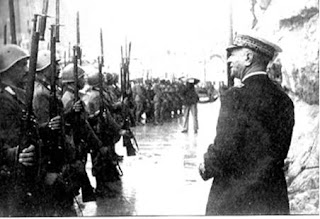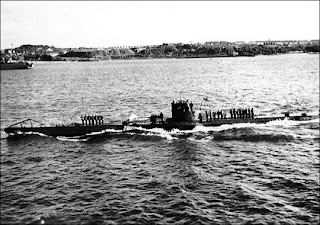.The German ISAF troops in the areas of Kabul and Kunduz were mostly passive until recently.
This has been much-criticized by people from countries who weren't ready to send their troops to these places to do it differently. Well, it looks as if the passivity has gone away to some degree (they are apparently using a new rules of engagement interpretation).
I'm generally not interested much in Afghanistan/ISAF/OEF because I consider that as a
meddling in a distant civil war with a poor policy/strategy and for very little potential advantage. It's a war of choice that's simply
not improving our situation in my opinion.

Yet, there are some interesting demonstrations of the political nature of war going on in Afghanistan - and I don't mean the difficulties of fighting together in a war with different intents and restrictions.
The passivity of German forces in the area Kunduz has kept open civil war away from that province. The civilian casualty count is extremely low. That's the good side of the coin.
The bad side is that the Taliban didn't need to do anything against the German troops for the pursuit of their political and logistical goals in the area. They were apparently able to gain political influence (again). The only really
necessary Taliban violence in the area was the one directed at political opposition and traitors.
Rather passive security forces don't intervene with such activity (and active ones don't do it well, either). It's therefore useless to attack them. Attacks could at best cause a local withdrawal, which wouldn't increase the insurgent's freedom of action significantly.
In fact, it's a mystery to me why the Taliban bothered to attack German patrols at all. The attacks on the outpost in Kunduz made some sense; they had the hope that this would force us to withdraw from it. That would have been a strong political push for the local Taliban.
The chance of a withdrawal was coupled with a huge risk: They could face a different, more active replacement or turn the passive security forces into active ones instead of achieving a withdrawal.
The situation is apparently quite similar to the history of the mostly passive British garrison of Basra. The British didn't exercise control of Basra most of the time and non-state powers took over (even openly), but the civil war symptoms were limited. The open rule of the Shi'ite militias exposed them to a relatively swift and decisive offensive of Iraqi government forces later on.
In the end, the supposedly poor British performance had kept massive bloodbaths away and the area was later quickly claimed by government forces. Paradoxically, the results of the "poor" performance don't look terrible to me.
This reminds me of a source that claimed a greater efficiency of Italian occupation troops in the Balkans of WW2 than of German occupation troops. The Italians were apparently reluctant to fight at that time and didn't add fuel to the flames while the Germans did exactly that - and failed against Tito's insurgents army.

- - - - -
It's a great achievement to keep away open civil war fighting in a civil war country, even if it's done in a peripheral province.
I got thinking about this as a component of an overall pacification strategy.
We might someday feel forced to intervene against genocide (examples Biafra and Rwanda) and find ourselves again stuck in a distant, alien and difficult to understand civil war. It might be useful to have a better strategy than used in Afghanistan.
I won't come closer to the COIN crowd than this, ever.
My strategic idea requires three components (in addition to host nation military and para-military forces):
A mostly passive security force.This doesn't intervene with political and criminal activity of hostile non-state actors. Its only mission is to keep open warfare away or to end it. It should deter against open warfare as much as possible. The security force protects itself, its supply convoys and fights whoever dares to fight openly. This security force includes convoy protection units.
Again; inactivity is the goal. It's
highly advantageous to keep the conflict cool and avoid general violence.
Third world infantry battalions look like
the best value for this.
 This was the "prevent bloodbaths" component.A mobile striking and quick-reaction force.
This was the "prevent bloodbaths" component.A mobile striking and quick-reaction force.This distinctively different force (uniforms, insignia, equipment, nationality, behaviour) is split up into regional commands and the reserve that adds enough punch to the passive security forces in combat.
Its other purpose is to clear areas that are under hostile control (not always, but if deemed necessary). Offensive operations require political authorization.
This force needs to be fearsome to its enemies and have overwhelming power at hand.
A central (not regional) mobile striking force reserve would have its material at a central position but most of its personnel in their home country. These reserves would be flown in in less than 48 hours if needed.
This was the "keep the enemy in the underground" component.A political action force This would include national and foreign diplomats and politicians, and small highly-trained bodyguard units. It would be assisted by an intelligence network. This political action force would pursuit political victory in the communities of its region of activity. The methods of this political action force would be chosen according to circumstances and could range up to covert
assassination of problematic leaders (skillfully blamed on others, of course).
This political action forces would also maintain propaganda media (radio mostly) for every language in the nation because this is the safest, least violence-provoking way (the possession of leaflets could be punished) of addressing the general population (instead of only key individuals or groups).
This political action force needs to have a very different appearance than the other components. It should not be associated with the others. I even suggest to use different nationalities and look (skin colour, cloth fashion) . Violent behaviour of the mobile striking force should not taint the image of the political action teams and any perception of unreliability that will be associated with the security forces must not apply to the political action teams as well.
The political force teams would at times use helicopter mobility, but prefer to use often changed or modified civilian vehicles for covert travel. They would usually appear surprisingly and leave relatively soon unless they get protection by hospitality. Unpredictability would be their chief protection against ambushes.
The political action teams need to have resources at their disposal (carrot and stick).
Politically friendly communities would be rewarded with investments and political allies would be rewarded with jobs. Bounty hunters, informants and employed indigenous agents need to be paid.
This political action force would NOT be military. It would be a political force with carrot and stick (rather a scalpel than a stick). Two covert liaison officers (with forward observer training) in civilian clothes should be the maximum of military involvement and they should be subordinate to all political members of the teams even in combat situations.
The political action force would be the main effort. All other efforts need to be subordinated.
I chose three specialist forces because the use of military units (with versatile or conventional warfare training) for all three purposes gave a less than stellar performance in the past. No matter how the RoE and morale looked like - the military was mediocre in two levels and caused many uncontrolled adverse side-effects.
The denial and suppression on two levels would leave the political, local activity left for the insurgents. They're usually best at this and can make use of a huge repertoire that includes rather despicable acts like terror.
An effective competition by the political action forces requires that they have an even better repertoire. Being polite, diplomatic and generous won't be enough to succeed everywhere.
I already mentioned assassination as a possible action, and I'd like to extend the 'carrot and stick' principle to blackmailing. The blackmailing would inflict trouble (like spraying fields before harvest), enforce loyalty (providing monthly food supply) and reward support (arrange for infrastructure improvements, advanced education opportunities for sons of influential families and jobs). The principle is simple; communities get in trouble if they resist and get rewarded if they're supportive. The middle ground - neutrality - yields neither trouble nor rewards from the political action teams.
In addition to the three forces I'd like to suggest some preventive (and hopefully temporary) ethnic cleansing. It's quite pointless to provide guards to small minorities (like a few families in a village) if you're trying to quell genocide between ethnic or other groups. It's better to be politically incorrect than to provoke widespread violence and many casualties.
I would move them (at least temporarily) to a safer place and make sure that no others move into their property and use it (housing, agricultural areas).
An assisted settlement in a safer place with an unlikely prospect of return looks much more promising to me than a very resource-drawing and marginally promising attempt to protect them.This is an essential part of the strategy because
violence needs to be kept at a minimum; this includes intra-civilian violence.
There are usually not enough peacekeepers/occupation troops to really control a country unless we include many cheap, lower performance troops. My concept didn't aim at "holding" ground or "controlling" areas or the population completely. I lower the expectation to a mere suppression of acts of war. These peacekeepers would offer the insurgents a compromise: The insurgents are safe from them if they don't commit acts of war. I believe that this is feasible with much less troops than a full (and often failing) attempt to "control" and "hold".
I'm still working on my concept for the only wars of choice I would support: Interventions against genocides. My working examples are the quite opposite cases of Biafra (slow, easily accessible, state vs. insurgents) and Rwanda (extremely short & intense, very remote, population group vs. population group). The intervention itself would look very differently depending on circumstances (easy in cases like Biafra, extremely demanding in cases like Rwanda). The post-bloodbath phase that need to cool down the conflict and prevent another eruption wasn't in my area of interest for years. I recently worked on a concept for that one - and this was a glance at a preliminary fragment.

 U.S. Defense Spending, 1906–2006
U.S. Defense Spending, 1906–2006































